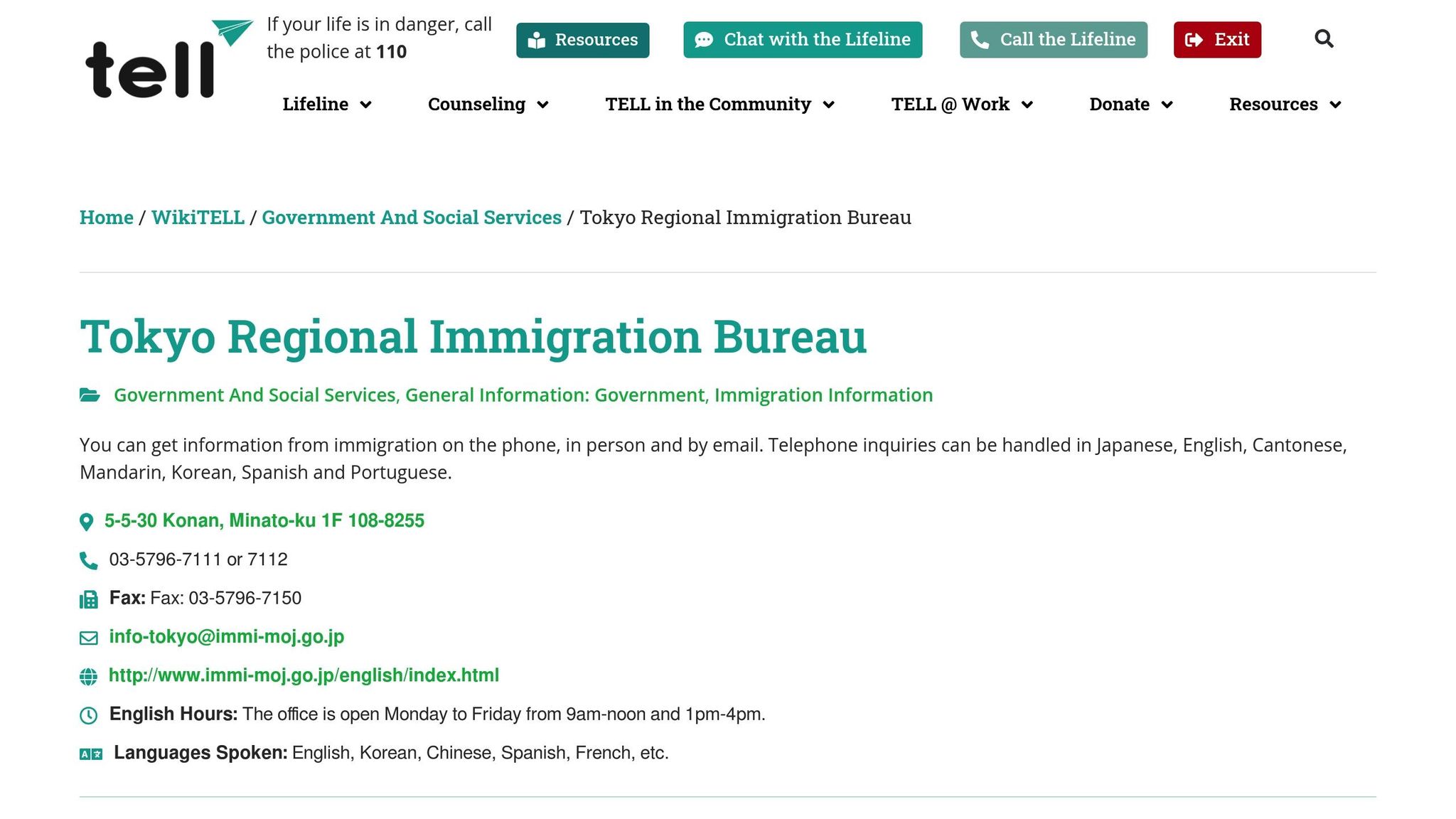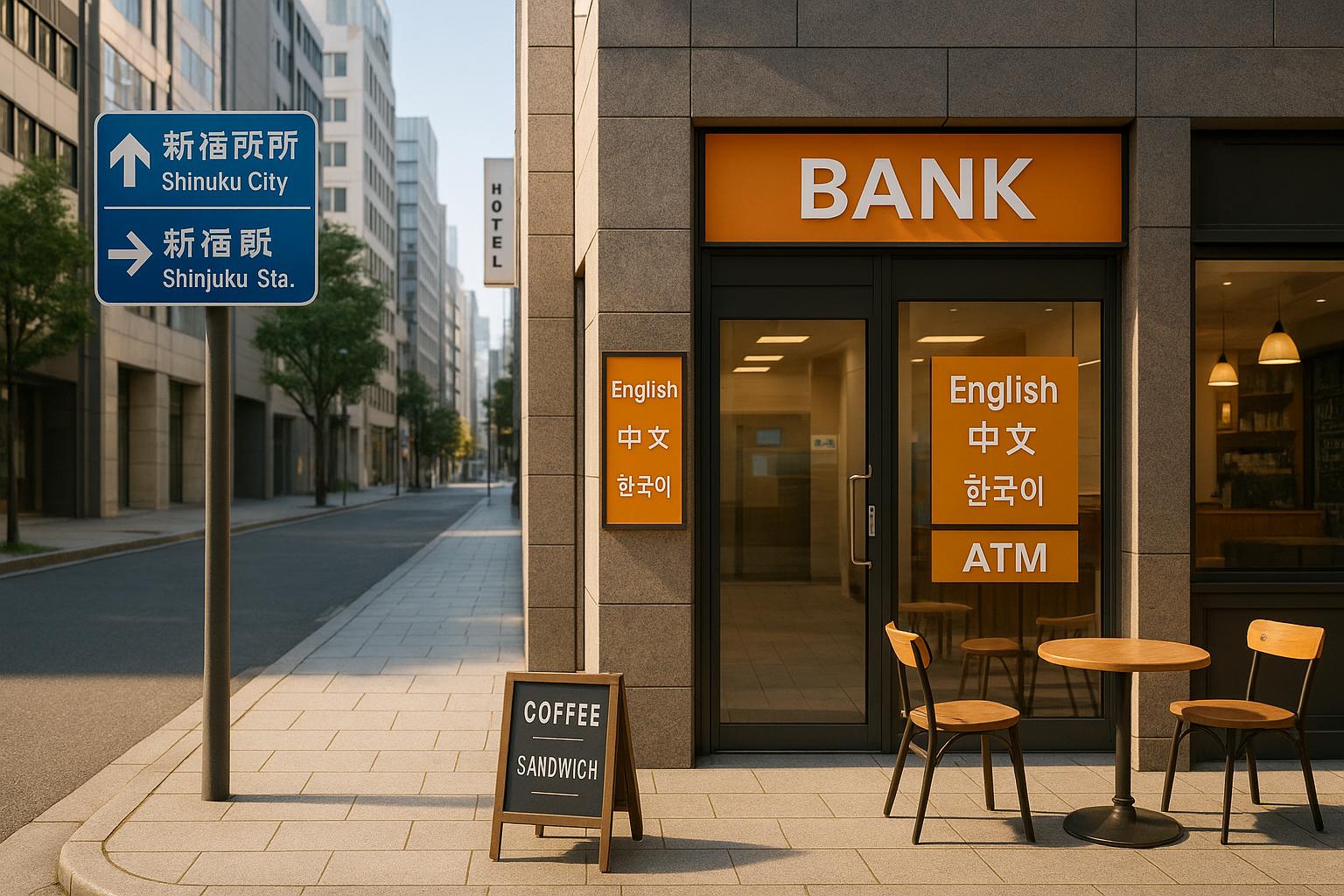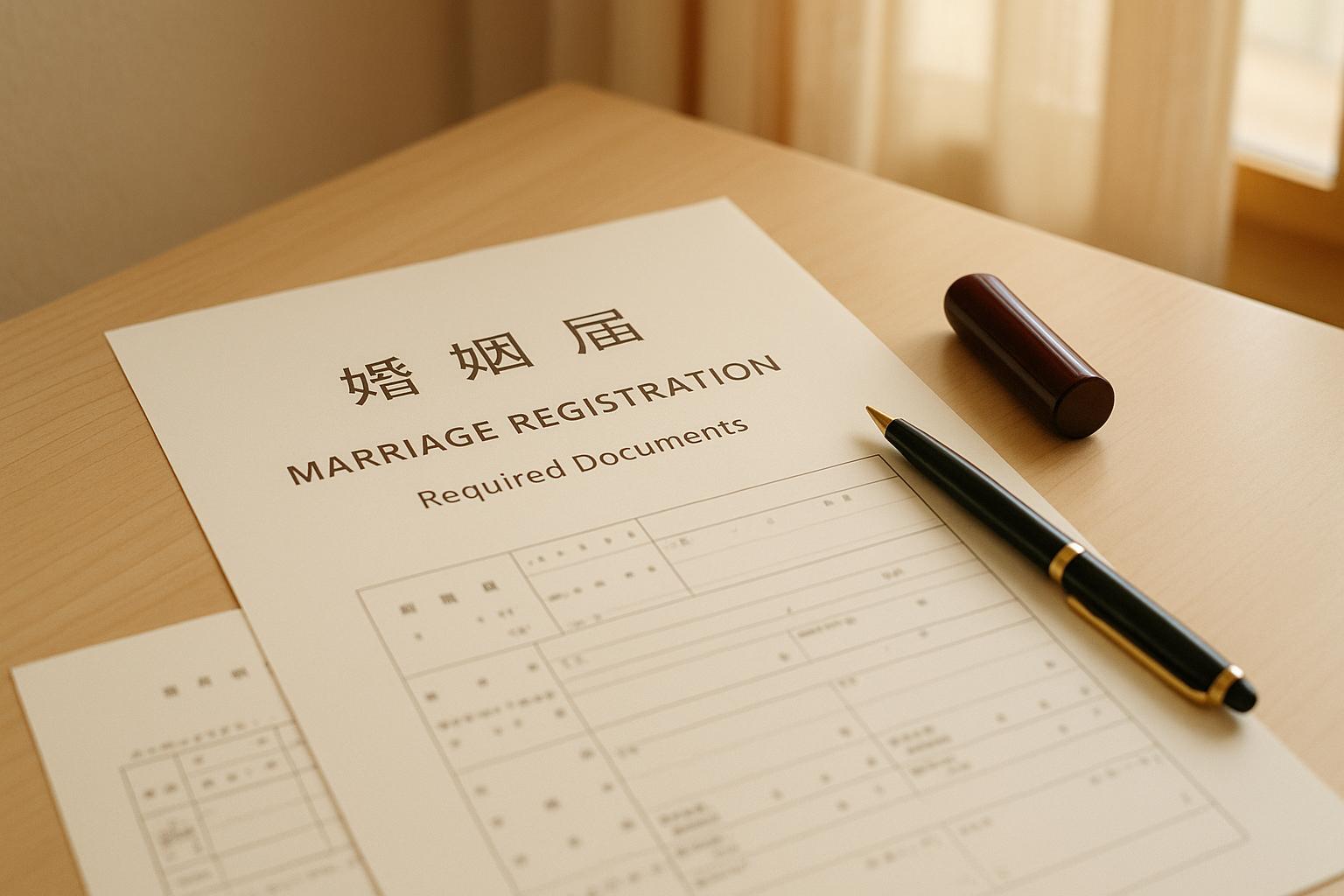Renewing your visa in Tokyo? Here’s what you need to know:
- When to Apply: Start your renewal process 90 days before your visa expires. Submitting on time grants an automatic 2-month extension until a decision is made.
- Required Documents:
- Application form, passport, residence card, and a recent photo.
- Additional documents depend on your visa type (e.g., proof of employment for work visas, enrollment certificate for student visas).
- Where to Apply: Visit the Shinagawa Immigration Office or use the online system (requires a My Number card and IC card reader).
- Processing Time: Typically 2–6 weeks. Delays are possible, so apply early.
- Fees: ¥4,000 revenue stamp for processing.
Tips for a Smooth Process:
- Keep all documents accurate and up-to-date.
- Translate non-Japanese documents and certify the translations.
- Avoid peak months (March, April, September, October) to reduce waiting times.
Stay compliant with your visa type, and consult an immigration lawyer if your case is complex. Once approved, update your residence card and local registration promptly.
Visa Types and When to Renew
Types of Visas and Renewal Periods
To ensure your visa remains valid, submit your renewal application within the designated timeframe. Doing so grants an automatic two-month extension. Here are some common visa categories in Tokyo and their renewal details:
| Visa Type | Renewal Window | Key Points |
|---|---|---|
| Work Visa | 90 days before expiry | Employment must be maintained |
| Student Visa | 90 days before expiry | Provide proof of enrollment |
| Dependent Visa | 90 days before expiry | Tied to the status of the primary visa holder |
| Spouse of Japanese National | 90 days before expiry | Marriage verification required |
| Permanent Resident | Not applicable | Must have consistent residence in Japan |
Each visa type has unique documentation requirements. Below is a breakdown of what you’ll need to gather.
Renewal Requirements by Visa Type
The documents required for renewal vary depending on your visa type:
- Work Visa: Proof of employment, such as a contract or company letter.
- Student Visa: Enrollment verification from your academic institution.
- Family-Based Visas: Evidence of your relationship, such as a marriage certificate or proof of dependency.
Always confirm the exact documentation needed with your local Immigration Bureau before submitting your application.
Processing times can take anywhere from five days to four weeks. To avoid delays, start your renewal process 90 days before your visa expires.
Since 2019, visa holders in certain categories must spend at least six months each year physically present in Japan to retain their residency status.
Required Documents Checklist
Basic Documents for All Applications
Make sure you have these essential items ready for your visa renewal:
| Document | Details |
|---|---|
| Application Form | Download the latest version from the Japan Immigration Services Agency website. |
| Passport Photo | - Size: 4cm × 3cm - Taken within the last 3 months - Light-colored background - Neutral facial expression - Face fully visible |
| Current Residence Card | Must be valid and in good condition. |
| Valid Passport | Ensure it has enough remaining validity. |
Note: Children under 16, mid- to long-term residents, and those applying for an extension of less than three months don’t need to provide a photo.
You’ll also need additional documents depending on your visa type.
Additional Documents by Visa Type
The specific paperwork required depends on your visa category. Here are some examples:
| Visa Type | Additional Documents |
|---|---|
| Work Visa | - Employment contract - Salary statements |
| Student Visa | - Enrollment certificate - Academic transcript |
| Spouse/Dependent Visa | - Marriage certificate, Birth certificate, or Family Registry |
Next, let’s look at how to handle translations for non-Japanese documents.
Document Translation Guidelines
If you’re submitting documents in a language other than Japanese, follow these rules for translations:
-
Translation Rules
- All non-Japanese documents must include a Japanese translation.
- Keep the formatting consistent with the original document.
- Certify the translation for accuracy.
-
How to Certify Translations
- Use certified translation services.
- Obtain a Translation Certificate for official Japanese documents.
- Make sure the translations are done by qualified professionals.
Important: Japanese government documents must be dated within six months of your application. Permanent documents, like diplomas, don’t need to meet this rule.
For certified translations, expect to pay around ¥2,700 per page (about $24.95). Be sure to include this in your visa renewal budget.
How to Submit Your Application
Applying at Shinagawa Immigration Office

Address: 5-5-30 Konan, Minato-ku, Tokyo 108-8255. To get there, take the 品99 bus from stop 24 at Shinagawa Station.
Office Hours:
- 9:00 to 12:00 and 13:00 to 16:00
- Closed on Saturdays, Sundays, and national holidays
It’s recommended to book an appointment online to avoid long waiting times. Once your application is submitted, you’ll receive a notification postcard with updates about your visa status.
| Application Step | Details |
|---|---|
| Document Submission | Submit all necessary documents at the counter |
| Postcard Receipt | Receive a notification postcard with your application info |
| Final Step | Bring the postcard back along with a ¥4,000 revenue stamp |
If you'd prefer a faster process, consider submitting your application online (details below).
Online Application Steps
The Immigration Services Agency of Japan (ISA) provides an online application option via its website. Here’s how to apply:
- Visit the ISA website.
- Go to the "在留手続" (Residence Procedures) section.
- Choose "オンライン手続" (Online Procedures).
- Follow the instructions to complete your application.
Application Day Preparation
Make sure you’re fully prepared for your visit with these tips:
Best Times to Visit:
Arrive early before the office opens or later in the afternoon before closing.
What to Bring:
- All required documents, neatly organized
- A valid passport and residence card
- A recent photo (3cm × 4cm, taken within the last 3 months)
- Personal items to keep yourself comfortable while waiting
Busy Seasons:
Expect longer waiting times during March, April, September, and October. Try to schedule your visit outside these peak months if possible.
Application Timeline Management
When to Start Your Application
Submit your visa renewal application within the 90-day window before your current visa expires. To avoid any last-minute stress, start gathering the necessary documents at least three months in advance. This extra time helps you stay prepared and reduces the risk of unexpected issues.
Once you've set your timeline, be ready to handle potential delays in the process.
Dealing with Processing Delays
Visa processing typically takes 2–6 weeks. If your visa is close to expiring, contact your bank to ensure your account isn't suspended during the process. If your renewal application was submitted on time but processing extends beyond your visa expiry date, your status remains valid until a decision is made.
Next, let’s go over common mistakes that could slow down or complicate your application.
Common Application Mistakes
Document-Related Issues:
- Forms that are incomplete or improperly filled out
- Missing translations for required documents
- Discrepancies in personal or document details
- Using correction tape or crossing out errors on forms
Financial Considerations:
- Unstable bank account activity
- Insufficient funds to meet visa requirements
- Irregular or unexplained transaction patterns
Status-Related Problems:
- Applying under the incorrect visa category
- Weak or unclear ties with sponsors
- Previous visa violations that have not been addressed
"Ensure that your primary activities in Japan align with your visa status throughout your stay. If you plan to make changes, such as switching jobs or starting a side business, consult with an immigration lawyer beforehand."
- Saki Nakahara, Immigration Lawyer
"Avoid fabricating information; unsupported explanations can lead to further difficulties."
- Saki Nakahara, Immigration Lawyer
Pro Tip: If you're missing a document when submitting your application, the immigration office might provide you with an envelope to mail it later. This can save you from making an extra trip.
sbb-itb-cbc0cbb
After Your Visa Renewal
Getting Your New Residence Card
When you get the notification postcard from immigration, head to the specified office to pick up your new residence card. Make sure to bring your current residence card and ¥4,000 in revenue stamps for processing fees. Before leaving, double-check that all your personal details and the validity period on the new card are correct.
If you have a My Number card, visit your local city hall with both your new residence card and My Number card to update your information. After that, ensure your records are also updated at your local ward office.
Ward Office Registration
Once you have your new residence card, go to your local ward office (kuyakusho) to update your resident registration to reflect your renewed visa status. The process is usually quick, taking around 15–20 minutes, as long as you have all the necessary documents.
Travel Permission and Re-entry
After completing your registration, you can apply for re-entry permits if you plan to travel outside Japan. Here are the two main types:
| Permit Type | Cost | Validity | Best For |
|---|---|---|---|
| Special Re-entry | Free | Up to 1 year | Short trips abroad |
| Multiple Re-entry | ¥6,000 | 1–6 years* | Frequent travelers |
*For permanent residents, the validity can extend up to 6 years. For temporary residents, it’s limited to the duration of your visa.
Special Re-entry Permit Process: If you’re leaving Japan for less than a year, you can use the special re-entry permit system. At the airport, fill out the ED card for Special Re-entry Permit and indicate that you plan to return to Japan.
Avoid using the special re-entry permit in the following cases: if you’ll be abroad for over a year, if your visa is valid for three months or less, if you’re undergoing status revocation procedures, or if you have a detention order.
Renewing Japanese Visas in Tokyo (it’s an extension)
Conclusion
Here’s a quick recap of the steps to ensure a smooth Tokyo visa renewal process. Start early - at least three months before your visa expires - since processing usually takes 2–4 weeks.
Key Steps to Follow
Document Preparation
Get all required documents ready well in advance. Immigration officials will carefully check your financial records and tax payment history, so keep everything organized and up to date during your stay.
Financial and Legal Compliance
Your application hinges on these factors:
- Paying taxes on time, including resident taxes.
- Ensuring your activities align with your visa type.
- Providing consistent information across all documents.
- Accurately reflecting your current situation.
What to Do After Approval
Once approved, pick up your new residence card, update your local registration, and, if you plan to travel, make sure to secure re-entry permits.
If you run into issues or expect changes in your job or activities, consulting an immigration lawyer can help you handle complex cases and improve your approval chances. Also, submitting your renewal application automatically extends your stay for up to two months or until a decision is made.
FAQs
What happens if I miss the 90-day deadline to renew my visa in Tokyo?
If you miss the 90-day renewal window before your visa expires, you could face serious consequences. Overstaying your visa may result in fines, detention, or even deportation, depending on the length of the overstay. Additionally, it may negatively impact future visa applications or your ability to re-enter Japan.
To avoid these issues, ensure you begin the renewal process well in advance. If you realize you’ve missed the deadline, contact the Immigration Services Agency immediately to explain your situation and seek guidance. Acting quickly can help minimize potential penalties.
What should I do to ensure my non-Japanese documents are properly translated and certified for my visa renewal in Tokyo?
To ensure your non-Japanese documents meet the requirements for visa renewal, have them translated by a professional translation service. The translation must be accurate, maintain the original layout, and include a Statement of Certification from the translator or agency to verify its authenticity.
When choosing a translation service, confirm they are experienced in handling immigration-related documents and familiar with Japanese legal standards. This will help avoid delays or rejections during the application process. Always double-check that all required documents are translated and certified before submission to the immigration office.
What should I do if my visa renewal takes longer than the usual 2 to 6 weeks?
If your visa renewal is delayed beyond the typical processing time of 2 to 6 weeks, it’s best to contact the Regional Immigration Services Bureau where you submitted your application. Processing times can vary depending on your case, and delays may occur if additional consultation with the Ministry of Foreign Affairs in Tokyo is required.
For peace of mind, ensure you have all necessary documents submitted correctly and keep a record of your application details. If you’re unsure about the status of your application, the immigration office staff can provide updates and guidance. Patience is key, as some cases may take longer than expected due to thorough examination processes.


